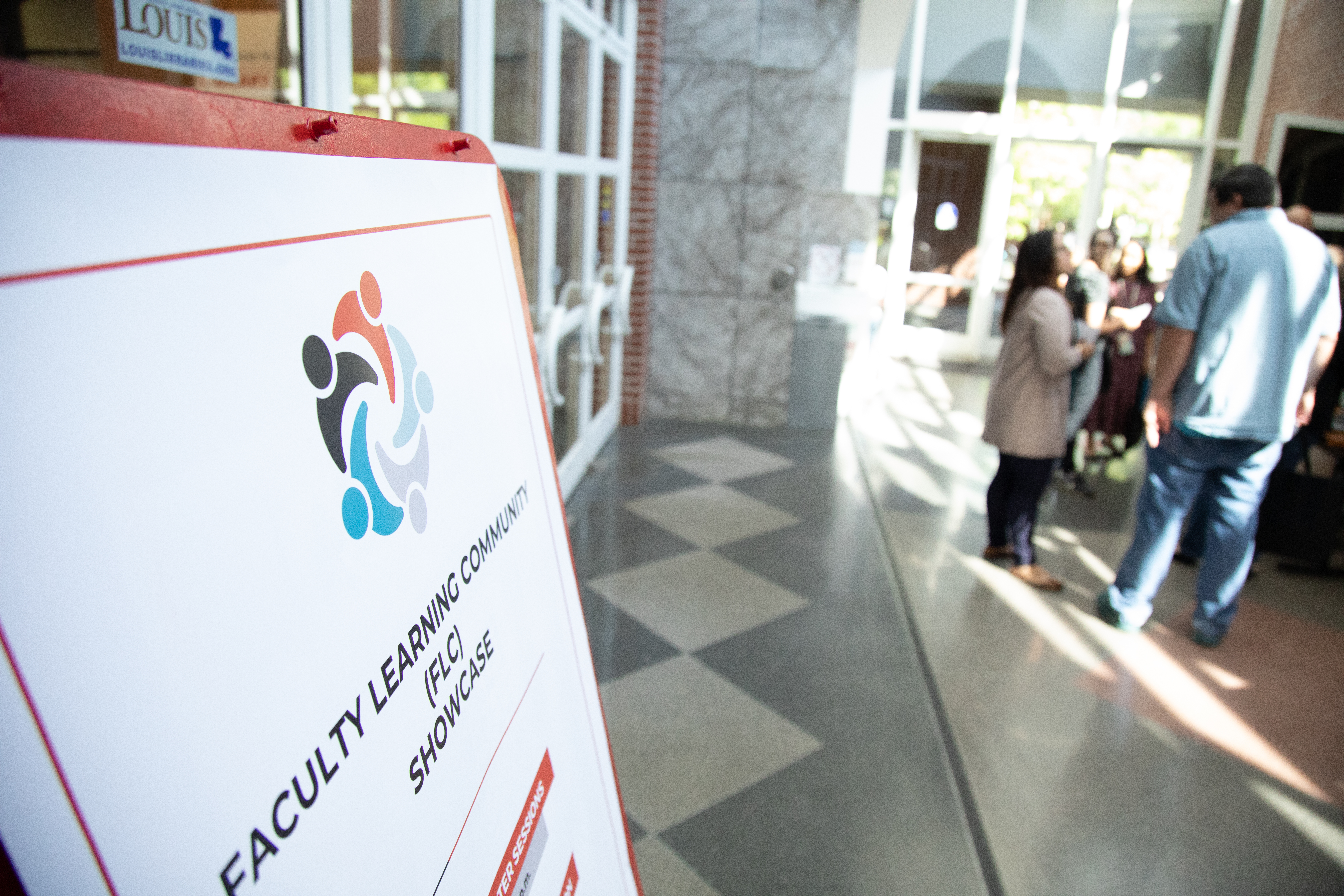Four proposals were accepted in the fall for the 2021-2022 Faculty Learning Community cohort, supported by the Office of Distance Learning.
The groups met throughout the academic year to explore topics aimed at innovating online learning at the University of Louisiana at Lafayette.
Their efforts culminated in a showcase this spring, and each group shared the following results.
Mission Possible: Exploring Microsoft Office 365 Apps for Engaging Learners
Facilitator: Amanda Mayeaux, Ed.D., Educational Foundations & Leadership, College of Education
FLC Group Members:
- Patricia Hunt
- Maylen Aldana
- Cortney Levine
- Jessie Broussard
- Lisa LeBlanc
- Christy McDonald Lenahan
- Michael Hebert
- Bertha Myers
The goal of this group was to explore engaging new applications provided by the Microsoft Office 365 suite of apps to enhance learning.
The FLC used an inquiry model to experiment with various apps.
"Through our experiences and support of each other, we grew in our pedagogical knowledge of how to choose and apply technologies to increase student engagement and success," says Facilitator Dr. Amanda Mayeaux.
Mission Possible met monthly or more often as a whole group but would also work in smaller partner groups to give feedback and support.
Results:
Mission Possible: Office 365 Learning Community Presentation
Improving Accessibility, Diversity, Equity, and Inclusion through Open Educational Resources (OER)
Facilitator: Manyu Li, Ph.D., Psychology, College of Liberal Arts
FLC Group Members:
- Preeti John
- Hung-Chu Lin
- Warren Brown
- Erika Caramillo-Hatch
- Farzad Ferdowsi
- Jessica Pearce
- Leslie Bary
- Philip Hackney
This FLC aimed to introduce principles and innovative strategies for incorporating OER and OER-enabled pedagogy in online and hybrid course designs.
After participating in the FLC, faculty members now can:
- Identify the benefits of OER and know the current state of OER in their field.
- Evaluate and select Open Educational Resources that align with current standards of accessibility, diversity, and inclusion.
- Design an OER-based syllabus for an online or hybrid course in their field and apply OER course design strategies.
Specific themes included:
- Introduction to OER.
- Searching OER on repositories and organizing OER.
- Evaluating OER for content quality, accessibility, diversity, and inclusion.
- OER in online/hybrid course design.
- Creating or adapting OER.
- OER-enabled pedagogy.
- Resources on OER research and assessment, OER funding opportunities, and OER conference opportunities were shared within the group.
Group members were encouraged to collaborate on instruction and research. They built a list of available OER, used an established rubric to evaluate OER, and created an OER-incorporated syllabus.
Moving forward, group members should have a foundational knowledge of OER they can bring to long-term peer-mentoring and collaborations with other faculty in OER teaching and research.
Results:
Welcome to Open Educational Resources
Perception of OER at UL Lafayette Survey Results
Developing H5P Activities for Formative and Summative Assessments
Facilitator: Penny Powell, Biology, College of Sciences
FLC Group Members:
- Marissa LaJaunie
- Kathleen Espinoza
- Brandon Waltz
- Brooke Breaux
- William Schmidt
- Sherry Krayesky
- Jennifer Hamilton
This community worked together to develop H5P interactive activities through the UL Lafayette Moodle site.
H5P activities help to bridge the gap between lecture and lab for students who may not take lab classes. Instructors can also create course content activities to be used in online, hybrid and face-to-face learning environments.
Group members developed H5P activities that function as formative and/or summative assessments on many topics which could help students engage with difficult material. Assessments were easy for instructors to grade and helped identify which students needed extra help.
Group members met monthly over zoom and took turns presenting interactive projects they worked on and offering advice on how much work different projects took to complete in H5P.
Results:
What Inspired Us: H5P Presentation
What We Accomplished Together: H5P Video Demonstration
Lights, Camera, Action!: Best Practices for Producing Effective Demonstration Videos
Facilitator: Thomas Cline, Architecture & Design, College of the Arts
FLC Group Members:
- Henry Arhin
- Adam Feld
- Debra White
- Jane Managan
- Heather Birdsong
- Donald Broussard
This FLC was formed to explore best practices and test out innovative means of creating demonstration-focused video content that would be accessible, comprehensive, and interactive for students.
In face-to-face environments, teaching technical skills is accomplished through demonstration, answering student questions, and then having students practice the activities that affirm their understanding. In online, hybrid, or flipped classroom environments, we have been lacking for best practices on how to teach skills traditionally taught through demonstration in person.
The primary goal of this FLC was to provide a framework of tested and repeatable practices for content creation that ensures students can learn necessary skills, processes, and techniques in online and hybrid courses.
By establishing best practices for making skills-based demonstration videos, instructors can offer students a close-up POV look at a skill in a recorded format that students can access repeatedly as needed. Additionally, videos can depict health and safety guidance and protocols in detail.
Results:
Recording a Lecture with Panopto
Recording a Live Action Demonstration
